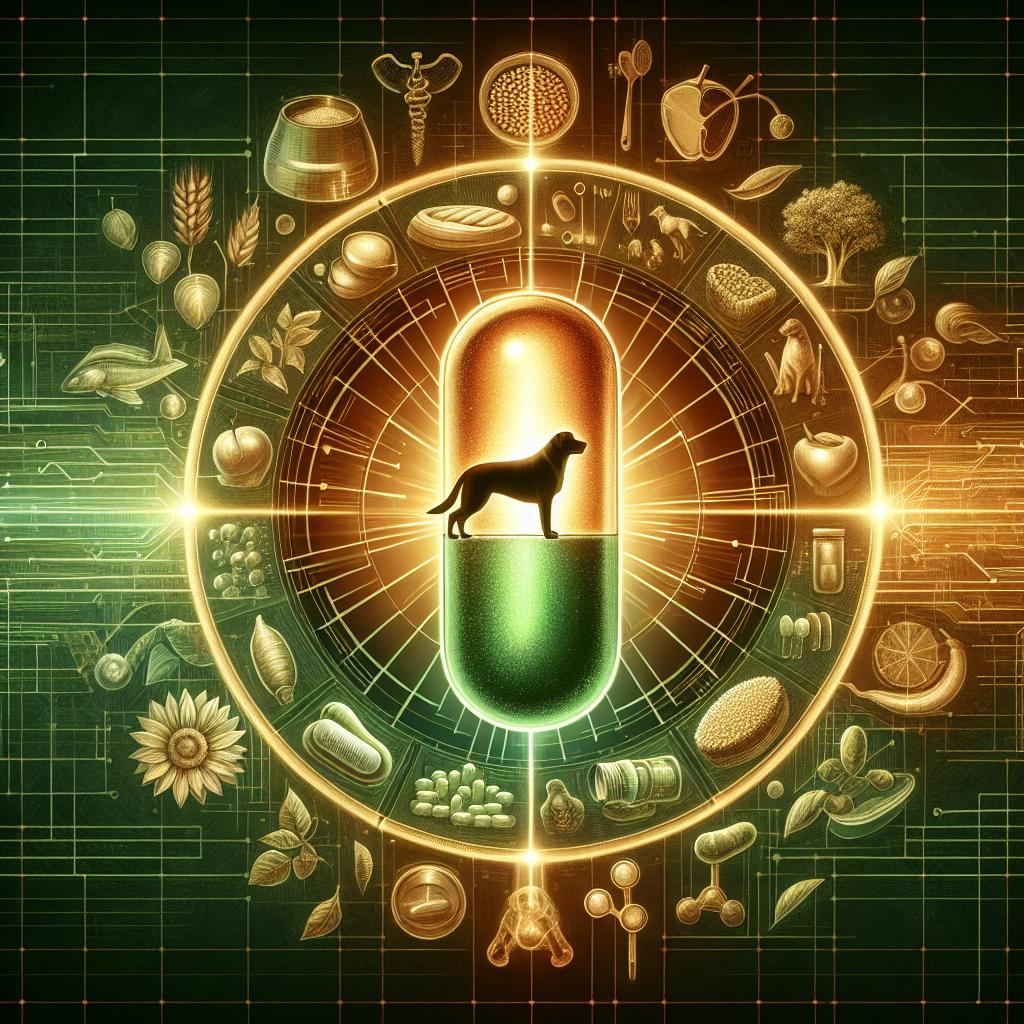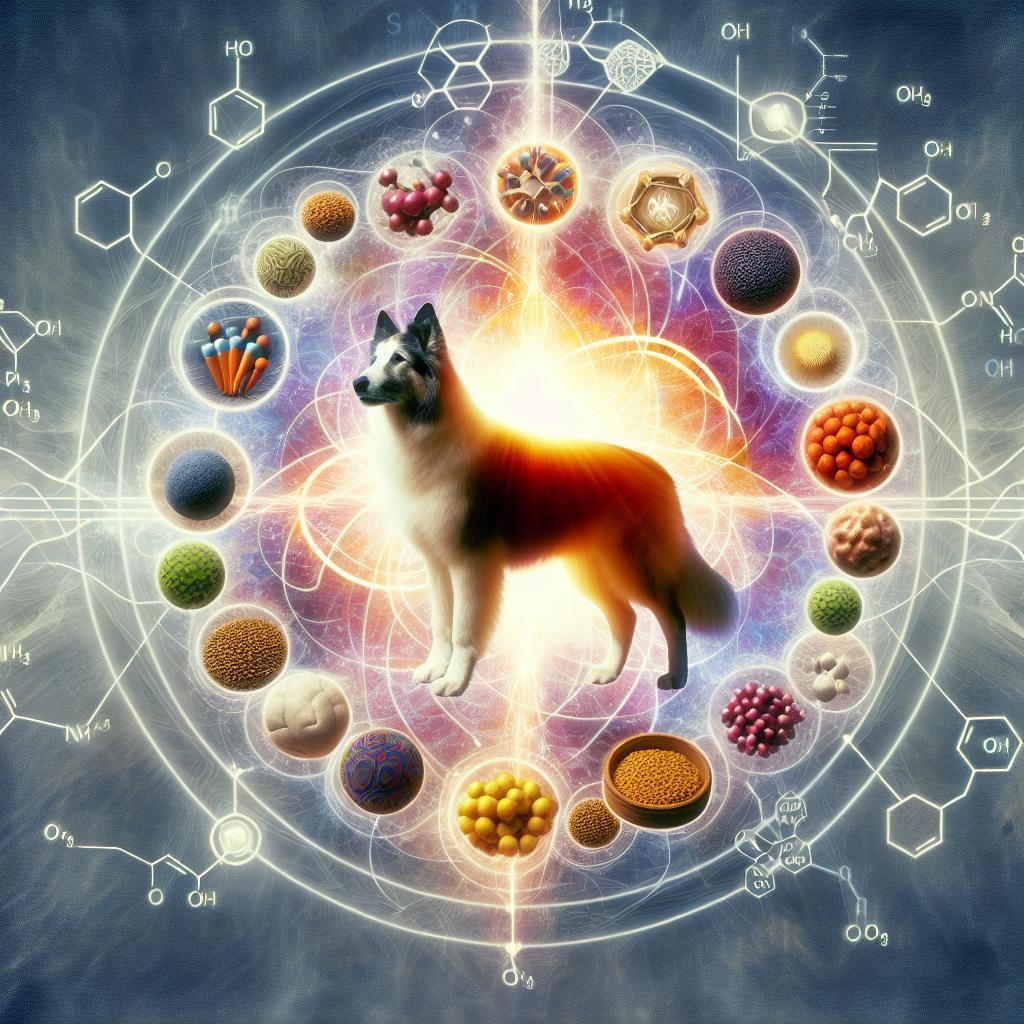The Role of Vitamin B Complex in Dog Nutrition
When it comes to ensuring the health and well-being of our furry companions, pet owners often focus on the staple ingredients of their dogs’ diets: proteins, fats, and carbohydrates. Yet, nestled within the intricate web of canine nutrition lies an often-overlooked group of nutrients—the B vitamins. Comprising eight essential vitamins that work harmoniously to support various bodily functions, the Vitamin B complex serves as the unsung hero in dog nutrition. From bolstering energy levels to promoting a healthy coat and enhancing immune function, these vital nutrients play a pivotal role in helping our dogs thrive. In this article, we will explore the significance of Vitamin B complex in canine diets, its sources, and the potential consequences of deficiencies, shedding light on how these small yet mighty vitamins can lead to happier, healthier pets.
Understanding the Essential Functions of Vitamin B Complex in Canine Health
The Vitamin B complex encompasses a group of eight essential nutrients, each playing a vital role in maintaining optimal canine health. These vitamins work synergistically to support various bodily functions, including energy metabolism and cognitive performance. Dogs require adequate B vitamins to ensure their metabolic processes run smoothly, which is crucial for converting food into energy. Furthermore, deficiencies in these vitamins can lead to a range of health issues including skin disorders, lethargy, and a weakened immune system.
Among the different B vitamins, B1 (Thiamine) is important for nerve function, while B2 (Riboflavin) aids in the production of red blood cells. B3 (Niacin) contributes to a healthy digestive system, and B6 (Pyridoxine) plays a key role in protein metabolism. Other vitamins in the complex, such as B12 (Cobalamin), are essential for maintaining a healthy nervous system and promoting overall vitality. To ensure these nutrients are part of a balanced diet, pet owners should seek out high-quality dog food or supplements that include these vital vitamins. Here’s a quick overview of the B vitamins and their primary benefits for dogs:
| B Vitamin | Function |
|---|---|
| B1 (Thiamine) | Nerve function and energy metabolism |
| B2 (Riboflavin) | Red blood cell production |
| B3 (Niacin) | Digestive health |
| B6 (Pyridoxine) | Protein metabolism |
| B12 (Cobalamin) | Nervous system maintenance |

Identifying Deficiencies: Signs Your Dog May Need More B Vitamins
Just like humans, dogs require an adequate supply of vitamins to thrive, and a deficiency in B vitamins can manifest in various ways. If you notice that your furry friend is displaying some unusual behaviors or health concerns, it might be time to reconsider their B vitamin intake. Common signs of deficiency include:
- Unexplained lethargy: If your dog seems more tired than usual and lacks energy for its daily activities, it may be a sign of insufficient B vitamins.
- Skin and coat issues: Dull fur, excessive shedding, or dandruff can indicate a lack of B vitamins essential for maintaining healthy skin and a shiny coat.
- Digestive problems: Symptoms such as diarrhea or constipation can arise from poor vitamin absorption, hinting at a dietary deficiency.
- Behavioral changes: Increased irritability, anxiety, or unusual aggression could be linked to nutrient imbalances.
Monitoring your dog’s overall health can help catch B vitamin deficiencies early. Consider keeping a close eye on their eating habits and physical condition. If several of the above symptoms are present, you may want to consult your veterinarian for a dietary evaluation. Additionally, understanding the specific roles of B vitamins can aid you in creating a balanced diet for your pet. You might find it beneficial to include foods rich in B vitamins, such as:
| Food Source | B Vitamin Content |
|---|---|
| Eggs | Biotin, B12 |
| Brown Rice | B1, B3, B6 |
| Spinach | B2, B9 |
| Chicken Liver | B1, B2, B3, B6, B12 |

Incorporating Vitamin B Sources into Your Dogs Diet: Best Practices
In ensuring your dog receives adequate Vitamin B, it’s best to incorporate a variety of sources into their diet. Consider including whole foods that are natural and packed with essential nutrients. Some excellent options consist of:
- Leafy Greens – Spinach and kale are rich in B vitamins and provide antioxidants.
- Meat – Chicken and beef liver are particularly high in B vitamins, especially B12.
- Fish – Salmon and mackerel not only supply B vitamins but also omega-3 fatty acids.
- Eggs – A versatile source of B vitamins and protein.
- Legumes – Beans and lentils are great plant-based options, bolstering your dog’s diet.
It’s essential to balance these sources appropriately, keeping in mind your dog’s size and dietary needs. A proper guideline to follow is ensuring that about 10-15% of their total diet comes from vitamin-rich foods. Additionally, when considering processed dog foods, select brands that specify high-quality ingredients and include the following on their labels:
| Vitamin B Type | Benefits |
|---|---|
| B1 (Thiamine) | Supports metabolism and nerve function |
| B2 (Riboflavin) | Promotes healthy skin, eyes, and blood cells |
| B6 (Pyridoxine) | Aids in protein metabolism and immune function |
| B12 (Cobalamin) | Essential for red blood cell production |

Supplementing with Care: Choosing the Right B Complex for Your Dog
When considering the best B complex supplement for your dog, it’s essential to evaluate several key factors to ensure you’re making an informed choice. First, look for high-quality ingredients—opt for supplements that list whole food sources or natural extracts rather than synthetic compounds. Additionally, check for certifications that guarantee the product is free from harmful additives and produced in facilities adhering to strict safety standards.
Another factor is the specific B vitamins included in the supplement. Different B vitamins serve distinct functions in maintaining your dog’s health; therefore, ensure that the formulation contains a balanced array of the following essential B vitamins:
- B1 (Thiamine) - vital for energy metabolism
- B2 (Riboflavin) – important for skin and coat health
- B3 (Niacin) – supports digestive system function
- B5 (Pantothenic Acid) – aids in nutrient absorption
- B6 (Pyridoxine) – essential for amino acid metabolism
- B7 (Biotin) – enhances skin and fur quality
- B9 (Folate) - crucial for cell division and growth
- B12 (Cobalamin) – supports nerve function and energy levels
With these factors in mind, you can select a B complex supplement tailored to your dog’s unique nutritional needs.
Consider also the mode of administration when choosing a B complex supplement. Many dogs are picky eaters, so finding a palatable option is key to ensuring your furry friend gets their vitamins. Supplements are available in various forms, such as chewable tablets, soft gels, or powders that can be mixed with food. Make sure the dosage recommendation fits your dog’s weight and age, and consult your veterinarian for guidance if uncertain.
| Form | Pros | Cons |
|---|---|---|
| Chewable Tablets | Easy to administer, tasty | Can be too large for some dogs |
| Soft Gels | High absorption rate | Some dogs may resist |
| Powders | Mixes easily with food | Less precise dosing |
Ultimately, striking the right balance in supplementation, aligned with your dog’s dietary requirements and lifestyle, will support their overall well-being.
Q&A
Q&A: Understanding the Role of Vitamin B Complex in Dog Nutrition
Q1: What is Vitamin B Complex, and why is it important for dogs?
A1: Vitamin B Complex is a group of water-soluble vitamins that play crucial roles in various bodily functions. This group includes vitamins B1 (Thiamine), B2 (Riboflavin), B3 (Niacin), B5 (Pantothenic acid), B6 (Pyridoxine), B7 (Biotin), B9 (Folate), and B12 (Cobalamin). For dogs, these vitamins are vital for energy metabolism, brain function, skin health, and the production of red blood cells. Each vitamin contributes uniquely, working harmoniously to support overall well-being.
Q2: How can I tell if my dog is getting enough B vitamins?
A2: Signs of Vitamin B deficiency in dogs can manifest in various ways. Common symptoms include fatigue, poor coat condition, skin issues, loss of appetite, and behavioral changes. If you notice these signs, it’s essential to consult your veterinarian, who can assess whether a vitamin deficiency might be the underlying cause.
Q3: Can dogs synthesise B vitamins on their own?
A3: While dogs can synthesize certain B vitamins, they still rely significantly on dietary sources to meet their nutritional needs. The ability to produce these vitamins varies among dogs and can be influenced by factors such as age, breed, and health status. Therefore, a balanced diet is crucial to ensure they receive all the necessary nutrients effectively.
Q4: Which foods are rich in Vitamin B Complex for dogs?
A4: Many dietary options can boost your dog’s intake of B vitamins. Good sources include lean meats (such as chicken and turkey), fish, eggs, green leafy vegetables, whole grains, and certain legumes. Incorporating a variety of these foods into your dog’s diet can help ensure they receive a rich spectrum of B vitamins.
Q5: Are there any risks associated with B vitamin supplementation?
A5: Yes, while B vitamins are generally considered safe, excessive supplementation can lead to adverse effects. Overdosing, particularly with B6 and B3, can cause toxicity symptoms, including nerve damage or skin issues. It’s essential to follow the guidance of your veterinarian when considering whether your dog needs extra B vitamins through supplements.
Q6: How can I ensure my dog is getting sufficient B vitamins?
A6: To ensure your dog’s nutritional requirements are met, provide a well-balanced, high-quality dog food that specifically lists B vitamins among its ingredients. Regularly consulting with your veterinarian to tailor a diet plan suited to your dog’s individual needs is also a good practice. Checking labels for vitamin content and incorporating fresh, B-rich foods can further enhance their diet.
Q7: Can a lack of B vitamins impact my dog’s behavior?
A7: Absolutely! B vitamins play a key role in neurological function and energy production. A deficiency can lead to changes in mood, irritability, or lethargy. Keeping an eye on your dog’s overall behavior can help you identify any potential nutritional inadequacies.
Q8: Is it necessary to give my dog B vitamin supplements if they eat a complete diet?
A8: If your dog is eating a well-balanced diet specifically formulated for their nutritional needs, additional supplementation may not be necessary. However, certain situations, such as recovery from illness or age-related changes, may warrant extra support. Always consult your veterinarian before adding any supplements to your dog’s diet.
By understanding the pivotal role of Vitamin B Complex in dog nutrition, pet owners can better navigate their choices, ensuring their furry friends lead healthier and happier lives. A well-informed approach to pet nutrition can make all the difference!
Future Outlook
the vital role of Vitamin B complex in dog nutrition cannot be overstated. From promoting healthy skin and a shiny coat to supporting a robust immune system and optimal energy levels, these essential nutrients form the backbone of our furry friends’ overall well-being. As responsible pet owners, it is our duty to ensure that our dogs receive a balanced diet rich in these critical vitamins, whether through high-quality commercial dog foods or carefully planned homemade meals. By understanding and implementing the importance of Vitamin B complex in their daily nutrition, we can help our canine companions lead healthier, happier lives. After all, a well-nourished dog is not just a pet, but a cherished member of the family, ready to share countless adventures and unconditional love with us.

